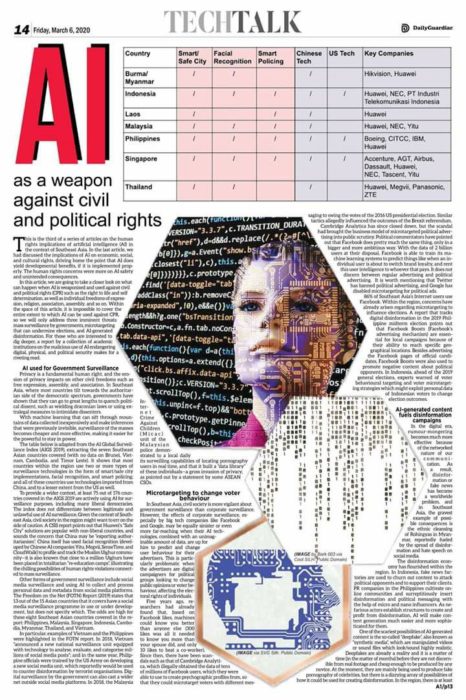The context of how artificial intelligence (AI) affects our rights as digital natives is worth unpacking, especially during political and public health crises, where online communication is a lifeline for many, and citizens are possibly being subjected to government surveillance and manipulation.
This is especially important when the crisis is of life-and-death importance, like the ongoing Covid-19 pandemic.
With this, EngageMedia worked with Dr. Jun-E Tan, an independent researcher and digital rights expert based in Kuala Lumpur, to unpack how AI plays out for the good — through improving public services and quality of life — and how it can be used by bad actors: to attack political, economic, and cultural rights of citizens, sometimes without them even knowing.
The collaboration resulted in several outputs: a blog post about how AI is tackled during Coconet II: Southeast Asia Digital Rights Camp, a three-part series on AI and human rights in Southeast Asia, and a video wrapping up the discourse for the whole engagement.
AI and Human Rights Video
Produced by EngageMedia, the video athe the top provides an overarching feature of issues on AI, human rights, and its Southeast Asia context, summarizing the issues raised by this series on AI and Human Rights.
Featuring interviews from Dr. Jun-E Tan and Red Tani of EngageMedia, it was shown during the Myanmar Digital Rights Forum on Feb. 28 and 29, 2020, an event attended by more than 350 participants from government, business, and civil society. You can read our blog about the forum here.
The video highlights how AI issues relate to the context of Southeast Asia, particularly recent political movements against authoritarian regimes, as well as other social issues that are susceptible to online hijacking, through manipulation of online narratives and surveillance of dissenters.
AI and Human Rights in Coconet II
Prior to the production of the AI and Human Rights video, discussions about AI and its human rights implications actually started at Coconet II.
After the weeklong camp, Dr. Tan wrote about the learnings from the event, encapsulating how she started the camp with the assessment that AI is a subject of concern for digital rights activists, but is something that they want to learn on a much deeper level, to how Coconet II provided focus on AI and human rights.
“The sessions were very helpful for me, as a participant and a session organiser, to formulate and articulate the problems associated with machine learning from a digital rights perspective. They were also useful to form an initial community concerned about AI, continued through the AI channel in the Coconet Mattermost platform, which is one of its biggest channels with 48 members so far,” she said.
She also concluded that the conversations on AI and digital rights needed to extend beyond the digital rights camp, as the topic “will only increase in importance with time, as more people get connected digitally and more governments adopt these technologies.”
The importance of AI will only increase with time, as more people get connected digitally and more governments adopt these technologies.
- Dr. June-E Tan
This also served as the prelude for the three-part article series on AI and human rights in Southeast Asia, which she briefly mentioned in the blog as well.
You can read the full blog here.
3-part series about AI and Human Rights in Southeast Asia
Next up in the collaboration is the three-part article series on AI and its implications to civil, social, economic, cultural, and political rights in Southeast Asia.
This is a series of articles on the human rights implications of AI in the context of Southeast Asia
- Dr. Jun-E Tan
“This is a series of articles on the human rights implications of AI in the context of our region, targeted at raising awareness and engagement of civil society actors who work with marginalised communities, on rights advocacy, and on developmental issues, such as public health, poverty, and environmental causes,” Dr. Tan explained.
The series started its release towards the end of 2019, with an overview of the basic concepts and terms related to AI, as well as an introduction to the human rights context in AI and the Southeast Asia landscape.
It unpacked topics like digital authoritarianism through AI, underrepresentation in AI datasets, socioeconomic impacts of AI, and participation in AI governance through careful curation of recent related studies and publications.
You can check the first part of the series published in the Coconet social website here. The article was picked up for syndication by a Philippine news website and network sharing by Coconet members.
The second part of the series then zoomed in on the impact of AI in the economic, social, and cultural rights (ESCR) of citizens from Southeast Asia.
It first presented the possible benefits of AI in the development sector. “AI, when used strategically and appropriately, can provide immense developmental benefits. Economic growth is a much-touted benefit, but possibilities of AI to improve lives extend much further,” wrote Dr. Tan. This includes benefits in education, healthcare, traffic, and food security.
The article then elaborates the possible abuse of AI to interfere with economic, social, and cultural rights, especially on possibly worsening and even optimising inequality through undue bias in AI data and the system itself.
Read the second article in full via the Coconet social website here, and feel free to check out the republished article via Daily Guardian Philippines as well.
And lastly, the third article of the series focused on AI as a weapon against civil and political rights, which takes “a closer look on what can happen when AI is weaponised and used against civil and political rights (CPR) such as the right to life and self-determination, as well as individual freedoms of expression, religion, association, assembly, and so on.”
It tackled the use of AI for government surveillance, microtargeting to change voter behaviour, and the use of AI-generated content to fuel disinformation campaigns.
The series then focused on a note on civil society’s role on the AI and human rights issues presented: “AI can be, and has been, weaponised to achieve ends that are incompatible with civil and political rights. At the very least, the civil society within the region should invest energy and resources into following technological trends and new applications of AI so that it will not be taken by surprise by innovations from malicious actors. As is the nature of machine learning and AI, it is expected that the efficacy of the technologies will only get better.”
“Civil society and human rights defenders will need to participate in the discussions of AI governance and push for tech companies to be more accountable towards the possible weaponisation of the technologies that they have created, in order to safeguard human rights globally,” Dr. Tan wrote to conclude the series.
Civil society and human rights defenders will need to participate in the discussions of AI governance and push for tech companies to be more accountable
- Dr. Jun-E Tan
And lastly, the third article of the series focused on AI as a weapon against civil and political rights, which takes “a closer look on what can happen when AI is weaponised and used against civil and political rights (CPR) such as the right to life and self-determination, as well as individual freedoms of expression, religion, association, assembly, and so on.”
It tackled the use of AI for government surveillance, microtargeting to change voter behaviour, and the use of AI-generated content to fuel disinformation campaigns.
Daily Guardian Philippines syndicated the last part of the series and published it during their Mar. 6, 2020 print edition, and republished it online as well. You may also check the version published on the Coconet social website here.
The engagement was able to open the possibility for more mainstream discussion of a seemingly technical issue through presenting its implications
Overall, the collaboration on AI and its Southeast Asia Human Rights implications contributed to bridging the knowledge gap on the issue not just among digital rights activists who needed it for their advocacy — distribution in mainstream news sites and social platforms more broadly increased awareness among civil society.
The engagement was able to open the possibility for more mainstream discussion of a seemingly technical issue through presenting its implications, especially to those who should have guaranteed protections under their laws.
Although it’s relevant for everyone, it posed a challenge especially for civil society — acknowledge AI and its human rights implications as valid and actionable issues, educate yourselves and others about these, and do informed advocacy work in response to the current challenges and threats.
More AI resources in development
Through collaboration with the Coconet community, Dr. Tan has complied two helpful resources: a mapping of AI issues across the region, and a list of relevant resources for those who want to learn more about such issues. We will update this post once these pages are ready.
Vino Lucero is a Project and Communications Officer at EngageMedia. He is a journalist based in Manila.
The views expressed in this post do not necessarily reflect the views of the Coconet community, EngageMedia, APC, or their funders. Copyright of the article is held by the author(s) of each article. Check out our Contribution Guidelines for more information. Want to translate this piece to a different language? Contact us via this form. This publication is licensed with Creative Commons Attribution-NonCommercial-NoDerivatives 4.0 International.



